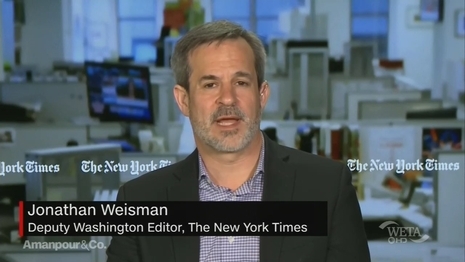 New York Times congressional correspondent Jonathan Weisman injected charges of racism into the 2022 campaign’s late stages under a partisan headline: “Democrats Say Racism Is the Real Messaging in Republican Crime Ads.”
New York Times congressional correspondent Jonathan Weisman injected charges of racism into the 2022 campaign’s late stages under a partisan headline: “Democrats Say Racism Is the Real Messaging in Republican Crime Ads.”
Weisman predicably launched by portraying Republican crime concerns as a cynical “seize” of an issue before quickly inserting race.
As Republicans seize on crime as one of their leading issues in the final weeks of the midterm elections, they have deployed a series of attack lines, terms and imagery that have injected race into contests across the country.
In states as disparate as Wisconsin and New Mexico, ads have labeled a Black candidate as “different” and “dangerous” and darkened a white man’s hands as they portrayed him as a criminal.
Nowhere have these tactics risen to overtake the debate in a major campaign, but a survey of competitive contests, particularly those involving Black candidates, shows they are so widespread as to have become an important weapon in the 2022 Republican arsenal.
But his first example was hopelessly lame.
In Wisconsin, where Lt. Gov. Mandela Barnes, who is Black, is the Democratic nominee for Senate, a National Republican Senatorial Committee ad targeting him ends by juxtaposing his face with those of three Democratic House members, all of them women of color, and the words “different” and “dangerous.”
More proof followed that the liberal media will never stop accusing Republicans of racism for the successful tactic of bringing up the issue of Willie Horton, a murderer who committed rape while out on weekend furlough, employed against liberal Democratic presidential candidate Michael Dukakis.
Appeals to white fears and resentments are an old strategy in American elections, etched into the country’s political consciousness, with ads like George Bush’s ad using the Black convict Willie Horton against Michael Dukakis in 1988, and Jesse Helms’s 1990 commercial showing a white man’s hands to denounce his Black opponent’s support for “quotas.”
If the intervening decades saw such tactics become harder to defend, the rise of Donald J. Trump shattered taboos, as he spoke of “rapist” immigrants and “shithole countries” in Africa and the Caribbean. But while Republicans quietly stood by advertising that Democrats called racist in 2018, this year, they have responded with defiance, saying they see nothing untoward in their imagery and nothing to apologize for.
While allowing that “legitimate policy differences have emerged between the two parties over gun violence, easing access to bail and funding police budgets,” he insisted in this "news" story: “But some of the Republican arguments could scarcely be called serious policy critiques.”
And Weisman’s observation that Trump “set a sharply different tone for his party on race," one worthy of condemnation, ignored the fact that the left and its media allies have labeled every Republican president since Ronald Reagan a dangerous racist.
Accusations of racism are standard from Weisman, who in late September co-wrote a long front-page story also accusing the GOP of racism, for emphasizing crime in their campaign rhetoric.
Weisman was obsessed by the black-white dichotomy in a hostile profile of Republican Senate candidate from Georgia, Herschel Walker.
He even accused Sen. Ted Cruz of Texas of “barely coded appeals to racism” during hearings into now-sitting Supreme Court Justice Ketanji Brown Jackson, in a story cowritten with Jazmine Ulloa.





